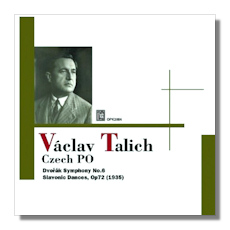
The Internet's Premier Classical Music Source
Related Links
- Dvořák Reviews
- Latest Reviews
- More Reviews
-
By Composer
-
Collections
DVD & Blu-ray
Books
Concert Reviews
Articles/Interviews
Software
Audio
Search Amazon
Recommended Links
Site News
 CD Review
CD Review
Antonín Dvořák

- Symphony #6 in D Major, Op. 60
- Slavonic Dances, Op. 72
Czech Philharmonic Orchestra/Václav Talich
Recorded at Abbey Road Studios, London
Opus Kura OPK2084 Monaural
The fact that the Czech Philharmonic Orchestra had to travel to London to record the symphonies of Antonín Dvořák speaks volumes about the less than international nature of the recording industry at the beginning of the 20th Century. Václav Talich had a very difficult career and life, so each of his few recordings is precious. Few conductors of his generation championed this music at all, and while no longer top recommendations, these readings are all historically important.
Opus Kura (distributed from Japan by Albany Music) retains a good deal of tape hiss, but consequently allows us to hear just how fine the Czech Philharmonic under Talich was. The strings sing in a way that we don't usually expect from this era – this was the 1930s – and the brass are neither blatting nor coarse. The great woodwind tradition of this orchestra is fully in evidence and only a touch of shrillness in the upper violins gives us anything close to ugly sounds. Compare this to Toscanini with the NBC Symphony Orchestra from the same time period, and you'll find the Czech band is easily the finer group.
The Symphony #6 has never attained the popularity of the composer's final three, but this work is one of my favorites in the repertoire. Within the last five years, Naxos has given collectors two readings of the work in very good sound, allowing it to gain a wider audience. Still, many listeners and critics alike continue to cherish the rich tradition of the Czech Philharmonic in this music. Here it must be stated that you can get the orchestra in excellent stereo recordings, but again, this recording has its own special qualities. The first movement is delightful, but the adagio is to die for. In the final two movements, the composer never loses focus, and the playing is remarkably fine for the period. Individual touches abound, though I imagine that most listeners will want modern sound, especially if they are new to this piece.
Ditto for the Slavonic Dances, Op. 72. Though naturally very well done and full of vivacious character, Talich made a later recording of the complete Dances late in his life, and those remain superior in terms of overall achievement. Also, only getting Op. 72 here means you also have to purchase OPK2080 to hear the conductor's way with Op. 46. Not that this is a problem; the Talich Dvořák 7th is one of the finest of its era. There is also a terrific 8th on Opus Kura, and a much later "New World" Symphony from the 1950s that is worth getting to know if you care at all about the composer. Talich was a giant, and this is the music which he knew best. If you collect historical reissues, this is a must.
Copyright © 2015, Brian Wigman



















